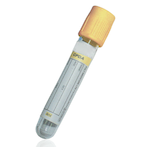IGF-1 (Insulin-like Growth Factor)
Specimen Volume
1 mL blood (250ul serum)Sample Preparation
Centrifuge and separate serum, store frozen. Serum stable at 4C for up to 8 days, thereafter store frozen
Turnaround Time
7 daysSample Processing In Laboratory
Usual
Sample Stability
4C for 8 days, -20C thereafter
General Information
Insulin-like growth factor - 1 (IGF-1) has sequence similarity to insulin, and similar biological functions as insulin e.g. inhibits lipolysis, increases glucose oxidation in adipose tissues. Other functions include growth-promoting effects on cartilage and enhanced synthesis of proteoglycans and collagen. IGF-1 levels normally are low in early childhood, increase gradually during childhood, peak during puberty, and then decline in adult life. The IGF-1 test is an indirect measure of the average amount of growth hormone (GH) being produced by the body. The concentration of IGF-1 is stable throughout the day, making it a useful indicator of average GH levels (as GH has pulsatile secretion).
Patient Preparation
None
Notes
IGF-1 is measured to help diagnose the cause of growth abnormalities and to evaluate pituitary function. (Formerly known as somatomedin)
IGF-1 concentrations are high in states of Growth Hormone excess and low in states of Growth Hormone deficiency.
Serum levels of IGF-1 are also low in patients with acute or chronic protein or calorie deprivation.
Reference Range
Age and gender related reference ranges, please contact laboratory (ext.16543)
Specifications
- EQA Status: NEQAS
- EQAS Scheme: Yes








